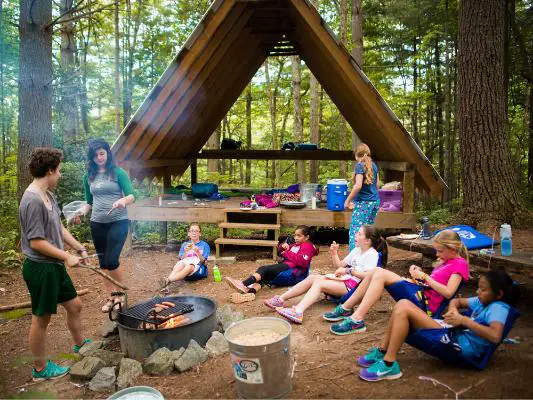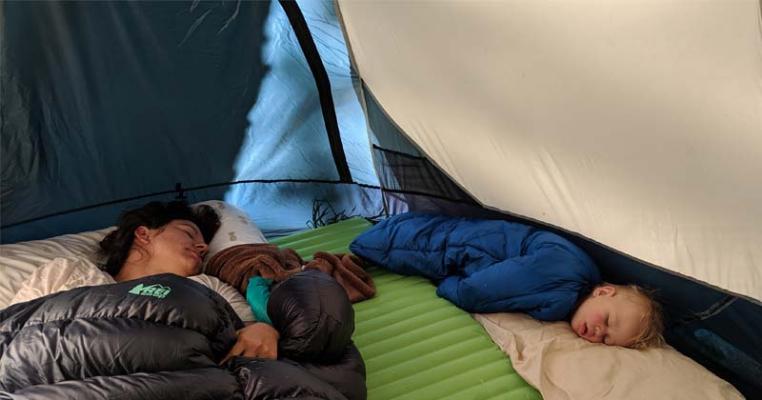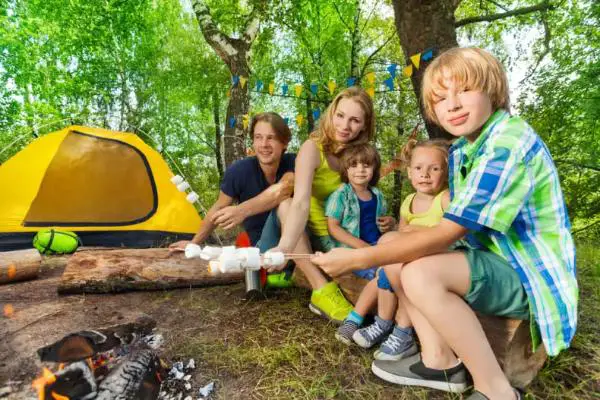Meri-Margaret Deoudes, former spokesperson for the National Wildlife Federation’s “Be Out There” initiative, emphasizes the growing trend of children spending excessive time indoors, tethered to screens. She advocates for camping as a valuable activity, emphasizing its ability to draw kids into the outdoors, whether engaged in hiking adventures or gathered around a campfire sharing spooky tales. “The Be Out There” initiative encourages children to reconnect with nature, promoting the myriad benefits of outdoor activities.
| While camping you may have a huge list of fun games and activities like Lunch Box Jokes. Shark Facts For Kid, Science Questions For Kids, so that you can make your camping memorable. |
15 Camping Activities For Toddlers In the Classroom
- Indoor Camping Tent: Set up a small indoor tent in the classroom, creating a cozy camping spot for toddlers to explore.
- Storytime by the “Campfire”: Use a fake flame or glow sticks to create a safe “campfire” and gather toddlers for a storytelling session.
- Nature Sensory Bin: Fill a bin with items like leaves, pinecones, and soft fabrics to stimulate toddlers’ senses and introduce them to nature.
- Camping Songs: Sing camping-themed songs together, incorporating actions and simple dance moves for added fun.
- Flashlight Fun: Let toddlers play with flashlights in a dimly lit area, creating a sense of exploration and discovery.
- DIY Binoculars Craft: Help toddlers make their binoculars using cardboard tubes, encouraging creativity and imaginative play.
- Animal Tracking: Use pictures or cutouts of animal footprints to create a trail for toddlers to follow, fostering gross motor skills.
- Nature Collage: Provide materials like leaves, twigs, and paper for toddlers to create a nature collage, promoting creativity and fine motor skills.
- Pretend Fishing: Set up a small pretend fishing area with toy fish and magnetic fishing rods for toddlers to catch and explore.
- Bird Feeder Craft: Engage toddlers in making simple bird feeders using birdseed and pinecones, promoting awareness of wildlife.
- Camping Snack Time: Have a snack with “camping-themed” treats, like trail mix or s’mores-inspired snacks.
- Nature Sounds Exploration: Play recorded nature sounds and ask toddlers to identify different sounds, enhancing auditory perception.
- Campsite Obstacle Course: Create a mini obstacle course with tunnels, cushions, and mats, encouraging toddlers to navigate and explore.
- Star Gazing: Use glow-in-the-dark stars to simulate a starry night on the classroom ceiling, sparking curiosity about the night sky.
- Sleeping Bag Rest Time: Provide small sleeping bags or blankets for a cozy rest time, reinforcing the camping theme in a calming way.
20 Camping Activities For Preschool
- Nature Scavenger Hunt: Create a list of items for preschoolers to find in nature, encouraging observation skills.
- Campfire Cooking: Set up a pretend campfire and let preschoolers engage in imaginative cooking with play food.
- DIY Binoculars Craft: Foster creativity by assisting preschoolers in making their binoculars using household materials.
- Animal Charades: Act out various animals for preschoolers to guess, promoting movement and laughter.
- Bug Exploration: Provide magnifying glasses for a close-up look at insects, teaching about small creatures in the environment.
- Nature Art Gallery: Encourage preschoolers to create artwork using natural materials like leaves, sticks, and flowers.
- Camping Yoga: Introduce simple yoga poses with a camping twist, such as “Tree Pose” or “Bear Walk.”
- Cloud Watching: Lay on blankets and observe cloud shapes, stimulating imagination and relaxation.
- Outdoor Storytime: Take storytime outdoors, reading camping-themed books under a shady tree.
- Camping Bingo: Create bingo cards with pictures of camping-related items for a fun and educational game.
- Nature Collage: Collect various natural items and create collages using glue and paper.
- Tent Building: Let preschoolers build small tents or forts using blankets and cushions, fostering teamwork.
- Rock Painting: Decorate rocks with paint to create a colorful campsite display.
- Seed Planting: Teach preschoolers about gardening by planting seeds in small pots or outdoor areas.
- Musical Campfire: Play music and have preschoolers dance around a pretend campfire, incorporating rhythm and movement.
- Bird Feeder Craft: Help preschoolers make simple bird feeders using recycled materials.
- Nature Puzzles: Create puzzles with images of animals, plants, and camping scenes for problem-solving fun.
- Camping Relay Races: Set up relay races with a camping theme, promoting physical activity and coordination.
- Nature Sounds Symphony: Use various natural objects to create a symphony of sounds, exploring auditory senses.
- Sunset Silhouette Art: Capture the beauty of the sunset by creating silhouette art using cutout shapes against a colorful background.
20 Children’s Camping Activities

- Nature Scavenger Hunt: Provide a list of items for children to find in the camping area, encouraging exploration and observation.
- Fishing Fun: Set up a fishing activity with toy rods or simple DIY fishing equipment for catch-and-release excitement.
- Campfire Cooking: Allow children to engage in safe and supervised cooking activities, like roasting marshmallows for s’mores.
- Bushcraft Skills: Teach basic bushcraft skills, such as knot tying or building a simple shelter using natural materials.
- Leaf and Flower Pressing: Encourage children to collect leaves and flowers, press them, and create art projects with the dried specimens.
- Nature Art Station: Provide art supplies for children to express their creativity using natural materials they find in the camping area.
- Wildlife Watching: Bring binoculars and guide children in observing local wildlife, birds, or insects in their natural habitat.
- Outdoor Storytelling: Create a storytelling circle around a campfire or under the stars, allowing children to share their own stories or enjoy camping-themed tales.
- Stargazing: Take advantage of the darkness in the camping area to introduce children to basic constellations and the wonders of the night sky.
- Campsite Clean-Up Challenge: Turn chores into a game by organizing a friendly competition for tidying up the camping site.
- Nature Crafts: Provide materials for crafting using natural items, such as making pinecone animals or leaf rubbings.
- Camping Sing-Along: Gather around for a campfire sing-along, complete with classic camping songs and hand-clapping fun.
- Insect Exploration: Equip children with magnifying glasses and bug-catching kits for a close-up look at the fascinating world of insects.
- Outdoor Yoga: Introduce simple and playful yoga poses suitable for children in nature.
- Treasure Hunt: Organize a treasure hunt, hiding small items or clues around the camping area for children to find.
- Nature Building Blocks: Collect sticks, rocks, and pinecones for children to build miniature structures or forts.
- Camping Olympics: Plan a series of camping-themed mini-games, from a three-legged race to a marshmallow toss.
- Birdhouse Building: Provide materials for constructing simple birdhouses, fostering a sense of responsibility for nature.
- Plant Identification: Teach children to identify different plants and trees around the camping site, enhancing their awareness of the natural environment.
- Starlit Reflection Time: End the day with a quiet reflection time under the stars, encouraging children to share their thoughts and experiences from the camping adventure.
FAQs
How do I entertain my kids camping?
Entertaining your kids while camping involves outdoor activities, creative play, and engaging games. Here are some ideas to keep your kids entertained during a camping trip:
- Nature Scavenger Hunt: Create a list of items for your kids to find in the surrounding nature, encouraging exploration and observation.
- Campfire Cooking: Involve them in safe and supervised cooking activities, such as roasting marshmallows for s’mores or making foil-picker meals.
- Outdoor Games: Bring simple games like frisbee, catch, or a ball for active play in the camping area.
- Storytelling: Gather around the campfire for storytelling time. Encourage your kids to share their own stories or tell camping-themed tales.
- Nature Crafts: Collect natural materials like leaves, twigs, and rocks for crafting. Kids can create art or build small sculptures.
- Scenic Hike: Plan a short nature hike suitable for kids. Point out interesting plants, rocks, or animals along the way.
- Star Gazing: Lay out blankets in the evening and enjoy some stargazing. Point out constellations or make up stories about the stars.
- Bike Riding: If the camping area allows, bring bikes for the kids to ride around and explore.
- Wildlife Watching: Equip your kids with binoculars and encourage them to observe the area’s birds, insects, or other wildlife.
- Camping Games: Play classic camping games like flashlight tag, hide and seek, or capture the flag.
- Fishing: If there’s a nearby lake or stream, try some fishing. Teach your kids basic fishing skills and enjoy the peacefulness of the water.
- Outdoor Art Gallery: Hang a string between trees and let your kids display nature-inspired artwork for everyone.
- Rock Painting: Collect smooth rocks and let your kids paint them. These can be used as decorations or hidden for others to find.
- DIY Nature Bracelets: Wrap a piece of masking tape around your child’s wrist with the sticky side out. They can attach small items like leaves or flowers to create a nature bracelet as they explore.
- Camping Journal: Provide each child with a small notebook to document their camping experiences, drawings, or thoughts.
- Campfire Songs: Sing traditional campfire songs and encourage your kids to create their own camping tunes.
- Tent Decorating: Let your kids personalize their sleeping area inside the tent with pillows, blankets, and stuffed animals.
- Binocular Adventures: Hand out binoculars and create a “bird-watching” adventure, identifying different birds in the area.
- Camping Olympics: Plan a mini Olympic event with camping-themed games like sack race, three-legged race, or marshmallow toss.
- Starlit Reflection Time: Before bedtime, reflect on the day’s adventures and discuss your favorite camping memories with your kids.
Is camping good for kids?
Camping offers children a holistic and enriching experience, promoting physical health, cognitive development, social skills, and a lifelong appreciation for the natural world.
Is family camping fun?
Yes, family camping can be a lot of fun!
What do kids sleep on camping?

Kids typically sleep in sleeping bags when camping. Sleeping bags are insulated and designed to provide warmth and comfort in outdoor settings. Children’s sleeping bags come in various sizes to accommodate different age groups, and they often feature fun designs or colors to make the camping experience more enjoyable for kids.
Additionally, kids may use sleeping pads or air mattresses underneath their sleeping bags to provide extra cushioning and insulation from the ground.
What is the best age for kids to camp?
Many families find that children as young as toddlers can enjoy and benefit from camping experiences. At this age, shorter camping trips close to home may be more suitable. As children grow, their ability to handle longer trips and more complex outdoor activities typically increases. It’s essential to consider the child’s comfort level, interests, and the logistics of camping to determine the most suitable age for your family.
Can a 5-year-old go camping?
Yes, a 5-year-old can go camping! Many families introduce their children to camping at a young age, which can be a wonderful experience. When camping with a 5-year-old, consider factors such as the length of the trip, the location, and the availability of child-friendly activities. Shorter trips near home, with simple and engaging outdoor activities, are often a great way to start camping with young children.

